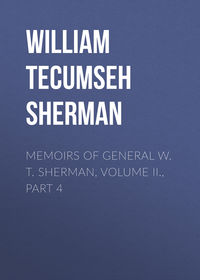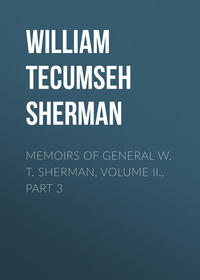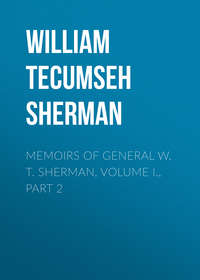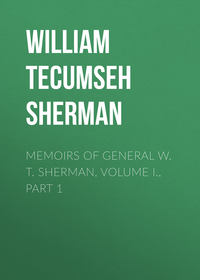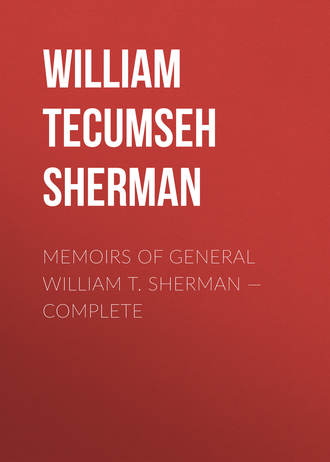 полная версия
полная версияMemoirs of General William T. Sherman — Complete
We all thought the matter had ended there, and accordingly the Governor returned to Sacramento in disgust, and I went about my business. But it soon became manifest that the Vigilance Committee had no intention to surrender the power thus usurped. They took a building on Clay Street, near Front, fortified it, employed guards and armed sentinels, sat in midnight council, issued writs of arrest and banishment, and utterly ignored all authority but their own. A good many men were banished and forced to leave the country, but they were of that class we could well spare. Yankee Sullivan, a prisoner in their custody, committed suicide, and a feeling of general insecurity pervaded the city. Business was deranged; and the Bulletin, then under control of Tom King, a brother of James, poured out its abuse on some of our best men, as well as the worst. Governor Johnson, being again appealed to, concluded to go to work regularly, and telegraphed me about the 1st of June to meet him at General Wool's headquarters at Benicia that night. I went up, and we met at the hotel where General Wool was boarding. Johnson had with him his Secretary of State. We discussed the state of the country generally, and I had agreed that if Wool would give us arms and ammunition out of the United States Arsenal at Benicia, and if Commodore Farragat, of the navy, commanding the navy-yard on Mare Island, would give us a ship, I would call out volunteers, and, when a sufficient number had responded, I would have the arms come down from Benicia in the ship, arm my men, take possession of a thirty-two-pound-gun battery at the Marine Hospital on Rincon Point, thence command a dispersion of the unlawfully-armed force of the Vigilance Committee, and arrest some of the leaders.
We played cards that night, carrying on a conversation, in which Wool insisted on a proclamation commanding the Vigilance Committee to disperse, etc., and he told us how he had on some occasion, as far back as 1814, suppressed a mutiny on the Northern frontier. I did not understand him to make any distinct promise of assistance that night, but he invited us to accompany him on an inspection of the arsenal the next day, which we did. On handling some rifled muskets in the arsenal storehouse he asked me how they would answer our purpose. I said they were the very things, and that we did not want cartridge boxes or belts, but that I would have the cartridges carried in the breeches-pockets, and the caps in the vestpockets. I knew that there were stored in that arsenal four thousand muskets, for I recognized the boxes which we had carried out in the Lexington around Cape Horn in 1846. Afterward we all met at the quarters of Captain D. R. Jones of the army, and I saw the Secretary of State, D. F. Douglass, Esq., walk out with General Wool in earnest conversation, and this Secretary of State afterward asserted that Wool there and then promised us the arms and ammunition, provided the Governor would make his proclamation for the committee to disperse, and that I should afterward call out the militia, etc. On the way back to the hotel at Benicia, General Wool, Captain Callendar of the arsenal, and I, were walking side by side, and I was telling him (General Wool) that I would also need some ammunition for the thirty-two-pound guns then in position at Rineon Point, when Wool turned to Callendar and inquired, "Did I not order those guns to be brought away?" Callendar said "Yes, general. I made a requisition on the quartermaster for transportation, but his schooner has been so busy that the guns are still there." Then said Wool: "Let them remain; we may have use for them." I therefrom inferred, of course, that it was all agreed to so far as he was concerned.
Soon after we had reached the hotel, we ordered a buggy, and Governor Johnson and I drove to Vallejo, six miles, crossed over to Mare Island, and walked up to the commandant's house, where we found Commodore Farragut and his family. We stated our business fairly, but the commodore answered very frankly that he had no authority, without orders from his department, to take any part in civil broils; he doubted the wisdom of the attempt; said he had no ship available except the John Adams, Captain Boutwell, and that she needed repairs. But he assented at last, to the proposition to let the sloop John Adams drop down abreast of the city after certain repairs, to lie off there for moral effect, which afterward actually occurred.
We then returned to Benicia, and Wool's first question was, "What luck?" We answered, "Not much," and explained what Commodore Farragut could and would do, and that, instead of having a naval vessel, we would seize and use one of the Pacific Mail Company's steamers, lying at their dock in Benicia, to carry down to San Francisco the arms and munitions when the time came.
As the time was then near at hand for the arrival of the evening boats, we all walked down to the wharf together, where I told Johnson that he could not be too careful; that I had not heard General Wool make a positive promise of assistance.
Upon this, Johnson called General Wool to one side, and we three drew together. Johnson said: "General Wool, General Sherman is very particular, and wants to know exactly what you propose to do." Wool answered: "I understand, Governor, that in the first place a writ of Habeas corpus will be issued commanding the jailers of the Vigilance Committee to produce the body of some one of the prisoners held by them (which, of course, will be refused); that you then issue your proclamation commanding them to disperse, and, failing this, you will call out the militia, and command General Sherman with it to suppress the Vigilance Committee as an unlawful body;" to which the Governor responded, "Yes." "Then," said Wool, "on General Sherman's making his requisition, approved by you, I will order the issue of the necessary arms and ammunition." I remember well that I said, emphatically: "That is all I want. —Now, Governor, you may go ahead." We soon parted; Johnson and Douglas taking the boat to Sacramento, and I to San Francisco.
The Chief-Justice, Terry, came to San Francisco the next day, issued a writ of habeas corpus for the body of one Maloney, which writ was resisted, as we expected. The Governor then issued his proclamation, and I published my orders, dated June 4, 1855. The Quartermaster-General of the State, General Kibbe, also came to San Francisco, took an office in the City Hall, engaged several rooms for armories, and soon the men began to enroll into companies. In my general orders calling out the militia, I used the expression, "When a sufficient number of men are enrolled, arms and ammunition will be supplied." Some of the best men of the "Vigilantes" came to me and remonstrated, saying that collision would surely result; that it would be terrible, etc. All I could say in reply was, that it was for them to get out of the way. "Remove your fort; cease your midnight councils; and prevent your armed bodies from patrolling the streets." They inquired where I was to get arms, and I answered that I had them certain. But personally I went right along with my business at the bank, conscious that at any moment we might have trouble. Another committee of citizens, a conciliatory body, was formed to prevent collision if possible, and the newspapers boiled over with vehement vituperation. This second committee was composed of such men as Crockett, Ritchie, Thornton, Bailey Peyton, Foote, Donohue, Kelly, and others, a class of the most intelligent and wealthy men of the city, who earnestly and honestly desired to prevent bloodshed. They also came to me, and I told them that our men were enrolling very fast, and that, when I deemed the right moment had come, the Vigilance Committee must disperse, else bloodshed and destruction of property would inevitably follow. They also had discovered that the better men of the Vigilance Committee itself were getting tired of the business, and thought that in the execution of Casey and Cora, and the banishment of a dozen or more rowdies, they had done enough, and were then willing to stop. It was suggested that, if our Law-and-Order party would not arm, by a certain day near at hand the committee would disperse, and some of their leaders would submit to an indictment and trial by a jury of citizens, which they knew would acquit them of crime. One day in the bank a man called me to the counter and said, "If you expect to get arms of General Wool, you will be mistaken, for I was at Benicia yesterday, and heard him say he would not give them." This person was known to me to be a man of truth, and I immediately wrote to General Wool a letter telling him what I had heard, and how any hesitation on his part would compromise me as a man of truth and honor; adding that I did not believe we should ever need the arms, but only the promise of them, for "the committee was letting down, and would soon disperse and submit to the law," etc. I further asked him to answer me categorically that very night, by the Stockton boat, which would pass Benicia on its way down about midnight, and I would sit up and wait for his answer. I did wait for his letter, but it did not come, and the next day I got a telegraphic dispatch from Governor Johnson, who, at Sacramento, had also heard of General Wool's "back-down," asking me to meet him again at Benicia that night.
I went up in the evening boat, and found General Wool's aide-de-camp, Captain Arnold, of the army, on the wharf, with a letter in his hand, which he said was for me. I asked for it, but he said he knew its importance, and preferred we should go to General Wool's room together, and the general could hand it to me in person. We did go right up to General Wool's, who took the sealed parcel and laid it aside, saying that it was literally a copy of one he had sent to Governor Johnson, who would doubtless give me a copy; but I insisted that I had made a written communication, and was entitled to a written answer.
At that moment several gentlemen of the "Conciliation party," who had come up in the same steamer with me, asked for admission and came in. I recall the names of Crockett, Foote, Bailey Peyton, Judge Thornton, Donohue, etc., and the conversation became general, Wool trying to explain away the effect of our misunderstanding, taking good pains not to deny his promise made to me personally on the wharf. I renewed my application for the letter addressed to me, then lying on his table. On my statement of the case, Bailey Peyton said, "General Wool, I think General Sherman has a right to a written answer from you, for he is surely compromised." Upon this Wool handed me the letter. I opened and read it, and it denied any promise of arms, but otherwise was extremely evasive and non-committal. I had heard of the arrival at the wharf of the Governor and party, and was expecting them at Wool's room, but, instead of stopping at the hotel where we were, they passed to another hotel on the block above. I went up and found there, in a room on the second floor over the bar-room, Governor Johnson, Chief-Justice Terry, Jones, of Palmer, Cooke & Co., E. D. Baker, Volney E. Howard, and one or two others. All were talking furiously against Wool, denouncing him as a d—-d liar, and not sparing the severest terms. I showed the Governor General Wool's letter to me, which he said was in effect the same as the one addressed to and received by him at Sacramento. He was so offended that he would not even call on General Wool, and said he would never again recognize him as an officer or gentleman. We discussed matters generally, and Judge Terry said that the Vigilance Committee were a set of d—-d pork-merchants; that they were getting scared, and that General Wool was in collusion with them to bring the State into contempt, etc. I explained that there were no arms in the State except what General Wool had, or what were in the hands of the Vigilance Committee of San Francisco, and that the part of wisdom for us was to be patient and cautious. About that time Crockett and his associates sent up their cards, but Terry and the more violent of the Governor's followers denounced them as no better than "Vigilantes," and wanted the Governor to refuse even to receive them. I explained that they were not "Vigilantes," that Judge Thornton was a "Law-and-Order" man, was one of the first to respond to the call of the sheriff, and that he went actually to the jail with his one arm the night we expected the first attempt at rescue, etc. Johnson then sent word for them to reduce their business to writing. They simply sent in a written request for an audience, and they were then promptly admitted. After some general conversation, the Governor said he was prepared to hear them, when Mr. Crockett rose and made a prepared speech embracing a clear and fair statement of the condition of things in San Francisco, concluding with the assertion of the willingness of the committee to disband and submit to trial after a certain date not very remote. All the time Crockett was speaking, Terry sat with his hat on, drawn over his eyes, and with his feet on a table. As soon as Crockett was through, they were dismissed, and Johnson began to prepare a written answer. This was scratched, altered, and amended, to suit the notions of his counselors, and at last was copied and sent. This answer amounted to little or nothing. Seeing that we were powerless for good, and that violent counsels would prevail under the influence of Terry and others, I sat down at the table, and wrote my resignation, which Johnson accepted in a complimentary note on the spot, and at the same time he appointed to my place General Volney E. Howard, then present, a lawyer who had once been a member of Congress from Texas, and who was expected to drive the d—-d pork-merchants into the bay at short notice. I went soon after to General Wool's room, where I found Crockett and the rest of his party; told them that I was out of the fight, having resigned my commission; that I had neglected business that had been intrusted to me by my St. Louis partners; and that I would thenceforward mind my own business, and leave public affairs severely alone. We all returned to San Francisco that night by the Stockton boat, and I never after-ward had any thing to do with politics in California, perfectly satisfied with that short experience. Johnson and Wool fought out their quarrel of veracity in the newspapers and on paper. But, in my opinion, there is not a shadow of doubt that General Wool did deliberately deceive us; that he had authority to issue arms, and that, had he adhered to his promise, we could have checked the committee before it became a fixed institution, and a part of the common law of California. Major-General Volney E. Howard came to San Francisco soon after; continued the organization of militia which I had begun; succeeded in getting a few arms from the country; but one day the Vigilance Committee sallied from their armories, captured the arms of the "Law-and-Order party," put some of their men into prison, while General Howard, with others, escaped to the country; after which the Vigilance Committee had it all their own way. Subsequently, in July, 1856, they arrested Chief-Justice Terry, and tried him for stabbing one of their constables, but he managed to escape at night, and took refuge on the John Adams. In August, they hanged Hetherington and Brace in broad daylight, without any jury-trial; and, soon after, they quietly disbanded. As they controlled the press, they wrote their own history, and the world generally gives them the credit of having purged San Francisco of rowdies and roughs; but their success has given great stimulus to a dangerous principle, that would at any time justify the mob in seizing all the power of government; and who is to say that the Vigilance Committee may not be composed of the worst, instead of the best, elements of a community? Indeed, in San Francisco, as soon as it was demonstrated that the real power had passed from the City Hall to the committee room, the same set of bailiffs, constables, and rowdies that had infested the City Hall were found in the employment of the "Vigilantes;" and, after three months experience, the better class of people became tired of the midnight sessions and left the business and power of the committee in the hands of a court, of which a Sydney man was reported to be the head or chief-justice.
During the winter of 1855-'56, and indeed throughout the year 1856, all kinds of business became unsettled in California. The mines continued to yield about fifty millions of gold a year; but little attention was paid to agriculture or to any business other than that of "mining," and, as the placer-gold was becoming worked out, the miners were restless and uneasy, and were shifting about from place to place, impelled by rumors put afloat for speculative purposes. A great many extensive enterprises by joint-stock companies had been begun, in the way of water-ditches, to bring water from the head of the mountain-streams down to the richer alluvial deposits, and nearly all of these companies became embarrassed or bankrupt. Foreign capital, also, which had been attracted to California by reason of the high rates of interest, was being withdrawn, or was tied up in property which could not be sold; and, although our bank's having withstood the panic gave us great credit, still the community itself was shaken, and loans of money were risky in the extreme. A great many merchants, of the highest name, availed themselves of the extremely liberal bankrupt law to get discharged of their old debts, without sacrificing much, if any, of their stocks of goods on hand, except a lawyer's fee; thus realizing Martin Burke's saying that "many a clever fellow had been ruined by paying his debts." The merchants and business-men of San Francisco did not intend to be ruined by such a course. I raised the rate of exchange from three to three and a half, while others kept on at the old rate; and I labored hard to collect old debts, and strove, in making new loans, to be on the safe side. The State and city both denied much of their public debt; in fact, repudiated it; and real estate, which the year before had been first-class security, became utterly unsalable.
The office labor and confinement, and the anxiety attending the business, aggravated my asthma to such an extent that at times it deprived me of sleep, and threatened to become chronic and serious; and I was also conscious that the first and original cause which had induced Mr. Lucas to establish the bank in California had ceased. I so reported to him, and that I really believed that he could use his money more safely and to better advantage in St. Louis. This met his prompt approval, and he instructed me gradually to draw out, preparatory to a removal to New York City. Accordingly, early in April, 1857, I published an advertisement in the San Francisco papers, notifying our customers that, on the 1st day of May, we would discontinue business and remove East, requiring all to withdraw their accounts, and declaring that, if any remained on that day of May, their balances would be transferred to the banking-house of Parrott & Co. Punctually to the day, this was done, and the business of Lucas, Turner & Co., of San Francisco, was discontinued, except the more difficult and disagreeable part of collecting their own moneys and selling the real estate, to which the firm had succeeded by purchase or foreclosure. One of the partners, B. R. Nisbet, assisted by our attorney, S. M. Bowman, Esq., remained behind to close up the business of the bank.
CHAPTER VI.
CALIFORNIA, NEW YORK, AND KANSAS
1857-1859Having closed the bank at San Francisco on the 1st day of May, 1857, accompanied by my family I embarked in the steamer Sonora for Panama, crossed the isthmus, and sailed to New York, whence we proceeded to Lancaster, Ohio, where Mrs. Sherman and the family stopped, and I went on to St. Louis. I found there that some changes had been made in the parent, house, that Mr. Lucas had bought out his partner, Captain Symonds, and that the firm's name had been changed to that of James H. Lucas & Co.
It had also been arranged that an office or branch was to be established in New York City, of which I was to have charge, on pretty much the same terms and conditions as in the previous San Francisco firm.
Mr. Lucas, Major Turner, and I, agreed to meet in New York, soon after the 4th of July. We met accordingly at the Metropolitan Hotel, selected an office, No. 12 Pall Street, purchased the necessary furniture, and engaged a teller, bookkeeper, and porter. The new firm was to bear the same title of Lucas, Turner & Co., with about the same partners in interest, but the nature of the business was totally different. We opened our office on the 21st of July, 1857, and at once began to receive accounts from the West and from California, but our chief business was as the resident agents of the St. Louis firm of James H. Lucas & Co. Personally I took rooms at No. 100 Prince Street, in which house were also quartered Major J. G. Barnard, and Lieutenant J. B. McPherson, United States Engineers, both of whom afterward attained great fame in the civil war.
My business relations in New York were with the Metropolitan Bank and Bank of America; and with the very wealthy and most respectable firm of Schuchhardt & Gebhard, of Nassau Street. Every thing went along swimmingly till the 21st of August, when all Wall Street was thrown into a spasm by the failure of the Ohio Life and Trust Company, and the panic so resembled that in San Francisco, that, having nothing seemingly at stake, I felt amused. But it soon became a serious matter even to me. Western stocks and securities tumbled to such a figure, that all Western banks that held such securities, and had procured advances thereon, were compelled to pay up or substitute increased collaterals. Our own house was not a borrower in New York at all, but many of our Western correspondents were, and it taxed my tune to watch their interests. In September, the panic extended so as to threaten the safety of even some of the New York banks not connected with the West; and the alarm became general, and at last universal.
In the very midst of this panic came the news that the steamer Central America, formerly the George Law, with six hundred passengers and about sixteen hundred thousand dollars of treasure, coming from Aspinwall, had foundered at sea, off the coast of Georgia, and that about sixty of the passengers had been providentially picked up by a Swedish bark, and brought into Savannah. The absolute loss of this treasure went to swell the confusion and panic of the day.
A few days after, I was standing in the vestibule of the Metropolitan Hotel, and heard the captain of the Swedish bark tell his singular story of the rescue of these passengers. He was a short, sailor-like-looking man, with a strong German or Swedish accent. He said that he was sailing from some port in Honduras for Sweden, running down the Gulf Stream off Savannah. The weather had been heavy for some days, and, about nightfall, as he paced his deck, he observed a man-of-war hawk circle about his vessel, gradually lowering, until the bird was as it were aiming at him. He jerked out a belaying-pin, struck at the bird, missed it, when the hawk again rose high in the air, and a second time began to descend, contract his circle, and make at him again. The second time he hit the bird, and struck it to the deck.... This strange fact made him uneasy, and he thought it betokened danger; he went to the binnacle, saw the course he was steering, and without any particular reason he ordered the steersman to alter the course one point to the east.
After this it became quite dark, and he continued to promenade the deck, and had settled into a drowsy state, when as in a dream he thought he heard voices all round his ship. Waking up, he ran to the side of the ship, saw something struggling in the water, and heard clearly cries for help. Instantly heaving his ship to, and lowering all his boats, he managed to pick up sixty or more persons who were floating about on skylights, doors, spare, and whatever fragments remained of the Central America. Had he not changed the course of his vessel by reason of the mysterious conduct of that man-of-war hawk, not a soul would probably have survived the night. It was stated by the rescued passengers, among whom was Billy Birch, that the Central America had sailed from Aspinwall with the passengers and freight which left San Francisco on the 1st of September, and encountered the gale in the Gulf Stream somewhere off Savannah, in which she sprung a leak, filled rapidly, and went down. The passengers who were saved had clung to doors, skylights, and such floating objects as they could reach, and were thus rescued; all the rest, some five hundred in number, had gone down with the ship.


